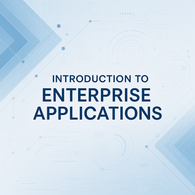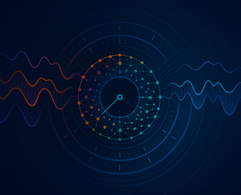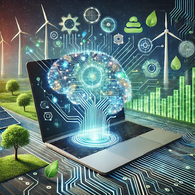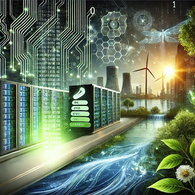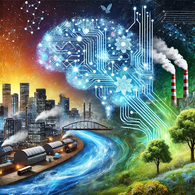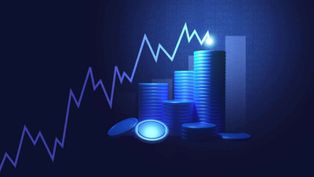Kurse im Selbststudium
Extreme weather events have caused severe damage and loss of life in recent decades. Traditional numerical weather prediction, while accurate, is computationally intensive—requiring supercomputers that consume massive amounts of energy. In contrast, energy-efficient AI offers a transformative alternative. This course explores how modern AI models can drastically reduce energy consumption and CO₂ emissions while improving the accuracy and accessibility of weather forecasting. Through practical examples, we demonstrate how techniques like LoRA fine-tuning, diffusion models, and GNSS-based sensing can enhance forecasting capabilities on both large and personal devices. By the end of this course, learners will understand how efficient AI methods enable sustainable, high-precision weather prediction for the future.
- Seit 17. Dez. 2025 im Selbststudium
- Big Data and AI
- Leistungsnachweis
- en
- de, en
Join this free online course to learn how to program with Python. You’ll be introduced to the fundamentals of the programming language like variables, data types, and loops. More complex topics like functions, libraries, and file input and output will also be covered. At the end of the course, you’ll be able to write simple Python programs to be prepared for your next programming challenges.
- Seit 26. Nov. 2025 im Selbststudium
- Programming
- Leistungsnachweis
- en
- de, en
In this course, you’ll get an overview of the key ingredients of enterprise applications - in general as well as on the example of SAP's offerings. The course covers an introduction to SAP and its history, business processes, as well as different modules of ERP Systems (e.g., Financials, Supply Chain Management, and Customer Relationship Management). The content is rounded up by an outlook into enterprise cloud platforms.
You don’t require much prior knowledge to attend the course and you’ll experience it like a student in the lecture hall. All sessions were recorded during the in-person lecture at the HPI in 2022. This course is a good foundation for to the (also free) courses Enterprise Goes Cloud 1 and Enterprise Goes Cloud 2.
This course is aimed at providing basic knowledge. There is no final examination. In this course, participants can only obtain a certificate of attendance. There is no discussion forum.
- Seit 15. Nov. 2025 im Selbststudium
- Teilnahmebestätigung
- en
- en
In this course, you’ll learn how to work with time series data — one of the most common and challenging types of data across industries. We’ll start from the basics, introducing you to key concepts like trends, seasonality, and stationarity, and gradually move into more advanced forecasting techniques. You’ll explore both classical statistical models and modern machine learning approaches, and see how deep learning architectures like RNNs, LSTMs, and transformers are being used for cutting-edge forecasting tasks today. Along the way, we’ll cover real-world examples from finance, healthcare, weather forecasting, and beyond. By the end of the course, you’ll have the skills to analyze time series data, build reliable forecasting models, and apply them to practical problems.
- Seit 1. Okt. 2025 im Selbststudium
- Big Data and AI, Data Science
- Leistungsnachweis
- en
- de, en
This course explores the critical intersection of AI and sustainability, highlighting how technological advancement can align with environmental responsibility. It offers insights into the dual nature of AI, noting its potential for increasing efficiency and driving sustainable innovation, while also acknowledging the significant energy consumption involved in training and applying AI models. In this course, we are not only examining the paradox of AI and sustainability but also provides actionable recommendations for incorporating sustainability into AI application development. By examining AI's transformative role and its environmental impact, the course offers a comprehensive understanding of how AI can be harnessed to support global sustainability goals effectively.
This course is part of the Sustainability in the Digital Age series, a collaborative project between colleagues from Stanford University, SAP and the Hasso Plattner Institute.
- Seit 26. Jun. 2025 im Selbststudium
- Leistungsnachweis
- en
- de, en
In an era where digital technologies are reshaping industries and daily life, the environmental impact of AI systems has become a growing concern. This course explores efficient AI methodologies to address these challenges. From deep learning model compression to low-bit quantization and collaborative inference, we delve into techniques that enhance computational efficiency and reduce energy consumption. We will also focus on low-bit quantization specifically for large language models (LLMs), showcasing cutting-edge open-source tools and models. Join us to learn how to build sustainable AI systems while pushing the boundaries of innovation.
This course is part of the Sustainability in the Digital Age series, a collaborative project between colleagues from Stanford University, SAP and the Hasso Plattner Institute.
- Seit 10. Jun. 2025 im Selbststudium
- Leistungsnachweis
- en
- de, en
Practical Computer Vision in PyTorch is a comprehensive, hands-on course for developers and practitioners eager to explore computer vision with PyTorch. It spans image classification, object detection, segmentation, and generative modeling. Emphasizing implementation, participants work through coding demos and projects with industry-standard tools and libraries. By the end, they will be able to build and fine-tune computer-vision models for real-world applications.
- Seit 21. Mai. 2025 im Selbststudium
- Big Data and AI, Data Science
- Leistungsnachweis
- en
- de, en
Digital systems offer a great opportunity to significantly reduce carbon emissions and can contribute to the efficient use of energy. However, all systems also need energy. This area of tension is addressed in the course: Sustainability in the digital age - Energy-Efficient Software Development. To effectively reduce the carbon footprint of digitalization, it is necessary to apply algorithmic efficiency and sustainability by design as guiding principles in digital engineering. We will introduce strategies to develop software that prioritizes minimized energy consumption through optimal coding and green testing practices. We will look at how the CO2 emissions of operating software applications can be measured and calculated. How to measure the performance and energy consumption of Large Language Models will be covered as well. Further we share approaches how to use advances in hardware technology and operate digital systems efficiently in data centers based on eco-friendly and cost-effective capacity management strategies.
This course is part of the Sustainability in the Digital Age series, a collaborative project between colleagues from Stanford University, SAP and the Hasso Plattner Institute.
- Seit 8. Apr. 2025 im Selbststudium
- Enterprise Computing, Cloud and Operating Systems, Programming
- Leistungsnachweis
- en
- de, en
Artificial Intelligence (AI) offers transformative potential across industries, but its development and deployment come with environmental costs. The course covers topics such as the carbon footprint of AI models, methods for measuring and reporting environmental impacts, and challenges in estimating the sustainability of AI technologies. Students will gain insights into energy and carbon accounting, along with case studies demonstrating how AI’s environmental footprint is assessed. The course aims to provide a comprehensive understanding of the relationship between AI and the environment, equipping learners with knowledge to contribute to more sustainable AI practices.
This course is part of the Sustainability in the Digital Age series, a collaborative project between colleagues from Stanford University, SAP and the Hasso Plattner Institute.
- Seit 18. Mär. 2025 im Selbststudium
- Big Data and AI
- Leistungsnachweis
- en
- de, en
This course explores the hype and realities surrounding AI, the challenges companies face in using AI profitably, and how Germany is performing in the AI landscape. It offers insights into how AI can power business strategies, be successfully integrated into operations, and scaled for long-term profitable growth. Created for managers and data experts looking to maximize AI’s potential, the course requires no prior experience, though a basic understanding of business strategy, data analytics, and AI concepts is beneficial.
- Seit 23. Dez. 2024 im Selbststudium
- Big Data and AI
- Leistungsnachweis
- en
- de, en
Gain a basic understanding of how numerical representations transform language! Explore the world of text embeddings in this online course, covering essential topics such as tokenization, historical models, modern techniques, and practical applications.
It's free of charge and no prior AI experience is necessary.
- Seit 24. Dez. 2023 im Selbststudium
- Big Data and AI, Data Science
- Teilnahmebestätigung
- en
- en
Despite the fact that it affects our lives on a daily basis, most of us are unfamiliar with the concept of a knowledge graph. When we ask Alexa about tomorrow's weather or use Google to look up the latest news on climate change, knowledge graphs serve as the foundation of today's cutting-edge information systems. In addition, knowledge graphs have the potential to elucidate, assess, and substantiate information produced by Deep Learning models, such as Chat-GPT and other large language models. Knowledge graphs have a wide range of applications, including improving search results, answering questions, providing recommendations, and developing explainable AI systems. In essence, the purpose of this course is to provide a comprehensive overview of knowledge graphs, their underlying technologies, and their significance in today's digital world.
- Seit 21. Nov. 2023 im Selbststudium
- Big Data and AI
- Leistungsnachweis
- en
- en
Beim Laden zusätzlicher Kurse ist ein Fehler aufgetreten. Bitte versuchen Sie es später noch einmal.


